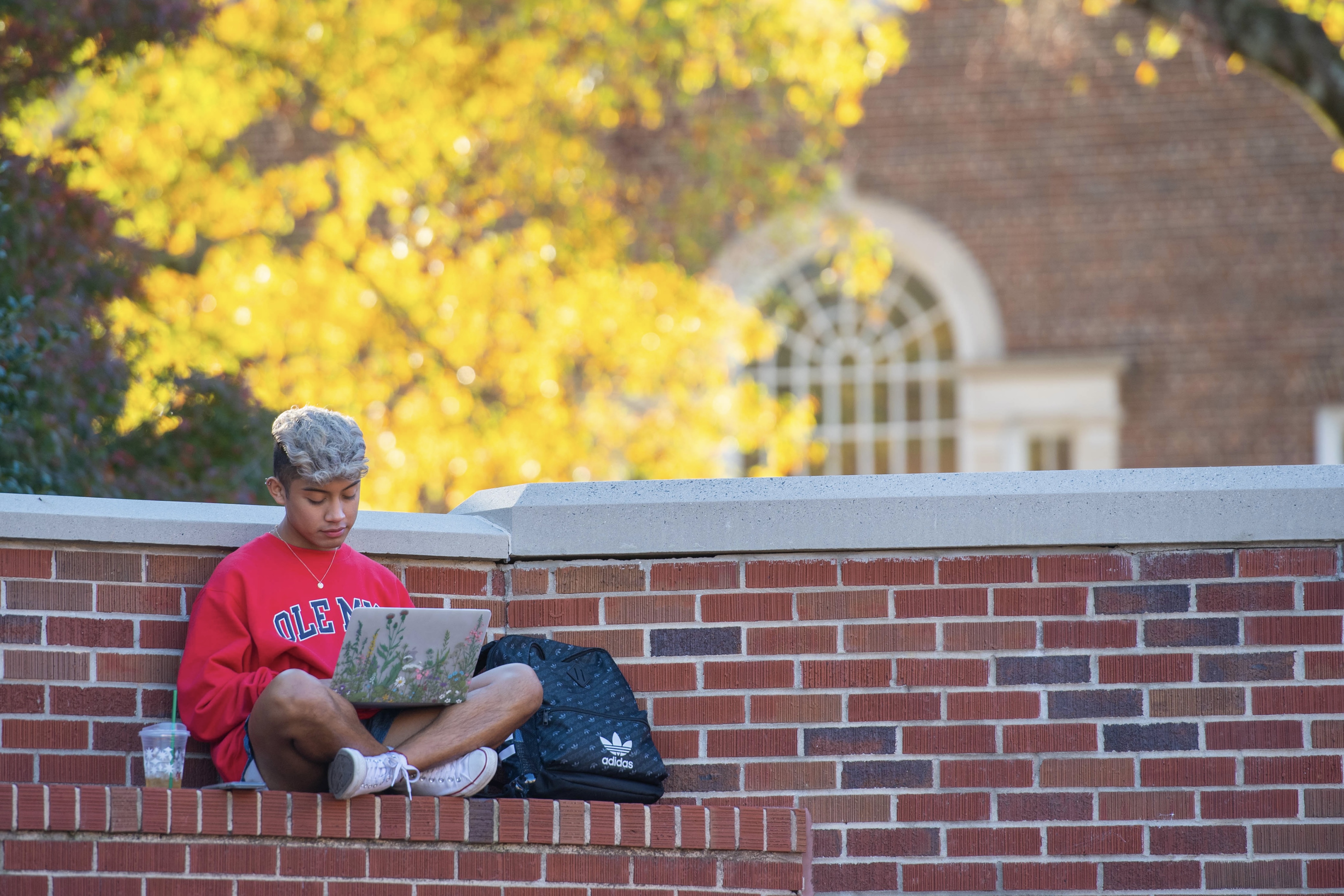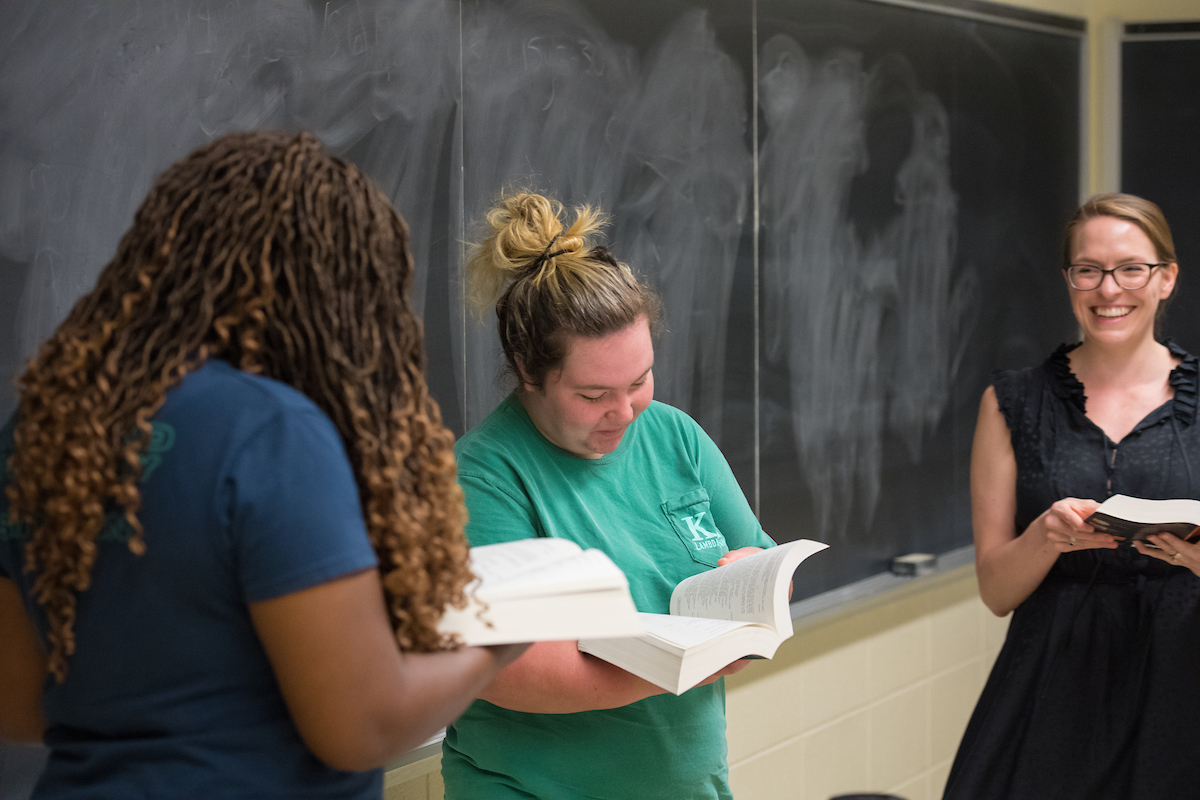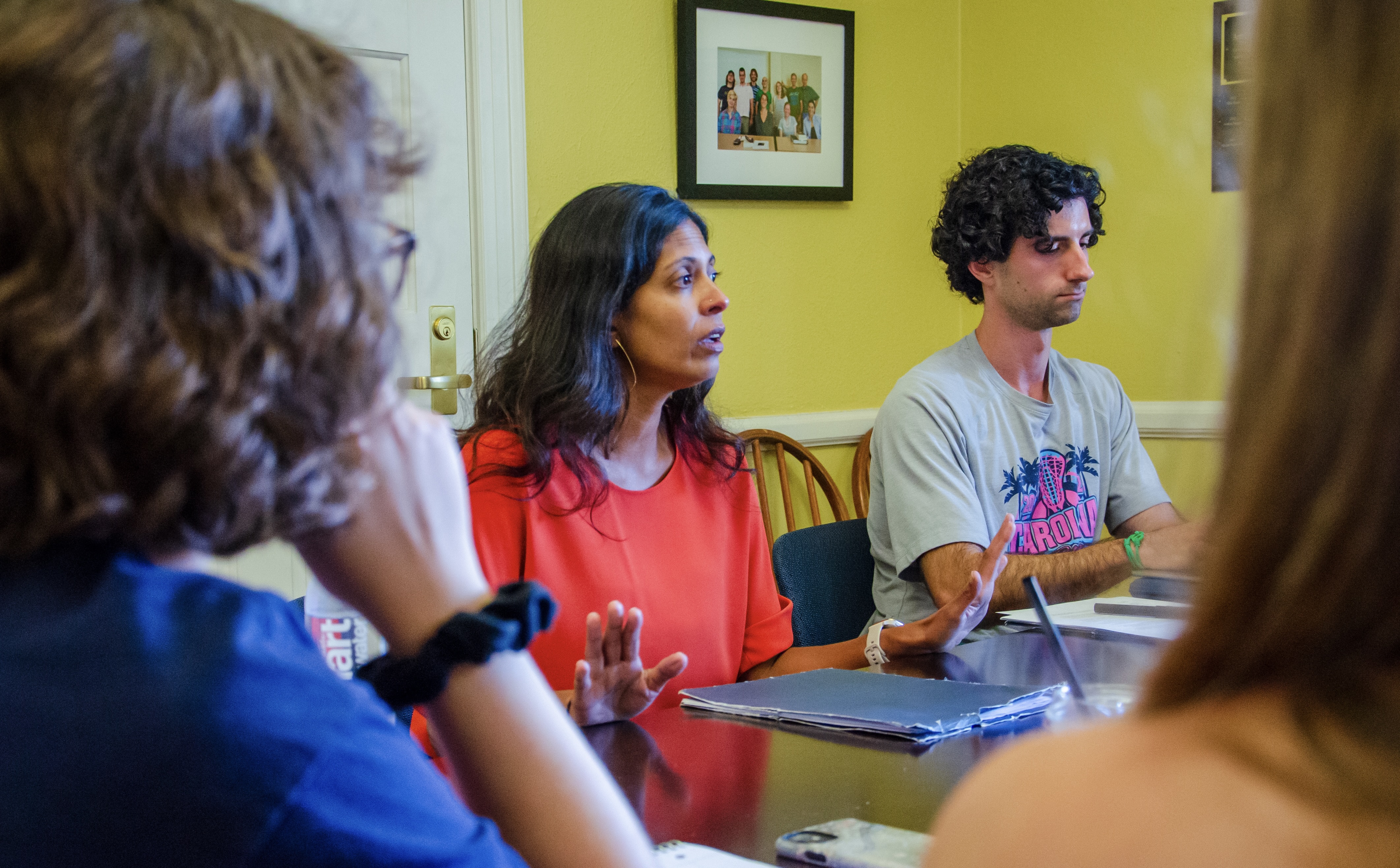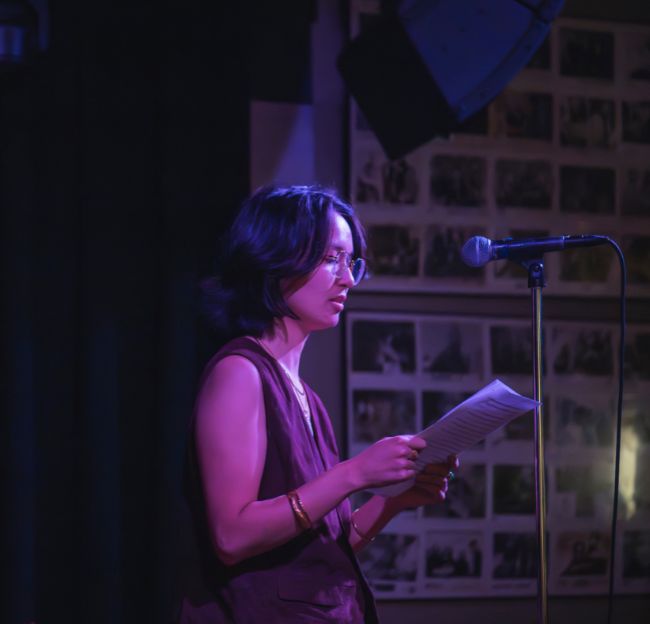Advising Resources & Scholarships in English
The Department of English is committed to student success by providing a variety of advising, career, and financial resources.

The Tools for Success
Navigating your way from enrollment to graduation can be daunting, but the faculty and staff in the Department of English are here to help you every step of the way.
Whether you’re an undergraduate or graduate student, you’ll find helpful information for every stage of the advising process, and information on scholarships and awards.
Student Advisors in the Department of English are organized by major.
Student Advisors for the B.A. in English
Students with last names beginning with A-J
- Dr. Justin Raden, jraden1@olemiss.edu
Students with last names beginning with K-Z
- Prof. Beth Spencer, ecspence@olemiss.edu
Student Advisors for the B.F.A. in Creative Writing
- Prof. Dustin Parsons, djparson@olemiss.edu
General Advising, Including Minors
- Dr. Scott MacKenzie, smack@olemiss.edu
To change your major, add a course, or for other general inquiries, please contact the main office at msgilmo1@olemiss.edu or visit our Department office at Bondurant C 128.
Browse our advising checklists based on your major or minor.
Course descriptions give you a complete look at the classes offered each semester, including descriptions, prerequisites, and schedules. They’re a great way to plan and explore options that match your interests and degree requirements.
Course Descriptions for the Current Semester
- Current Semester: Spring 2026
If you're interested in browsing our entire course catalog, feel free to check it out.
Course Descriptions for Past Semesters
Browse our course description archive by semester:
- Spring 2026
- Fall 2025
- Spring 2025
- Fall 2024
- Spring 2024
- Fall 2023
- Spring 2023
- Fall 2022
- Spring 2022
- Fall 2021
- Spring 2021
- Fall 2020
For previous course descriptions, please follow this link.
200 Level Courses
200-level survey courses are designed to provide a broad introduction to the study of literature by tracing the national or transnational development of cultures and literary forms.
Where possible, these courses should:
- Strive to include texts from multiple literary genres (poetry, narrative, nonfiction, drama, film, etc.),
- Familiarize students with the major logics of periodization (e.g., Realism, Modernism, Postmodernism) as well as relevant formal vocabulary (epic, sonnet; diction, metaphor; first/third-person narration, etc.).
- Examples include: reading response assignments, short answer questions on exams, longer close- reading questions on exams, etc.
English 299
English 299 is a course designed for the English major that prepares students for advanced coursework in English.
ENG 299 has two aims, to:
- Provide an undergraduate introduction to the discipline
- Develop the analytical and writing skills specific to literary study.
Readings and assignments should provide opportunities to develop a literary-critical vocabulary and to become familiar with the major genre categories—drama, poetry and prose fiction—as well as nonfiction prose, film, graphic narrative, and other genres, according to the instructor’s expertise and learning goals.
In addition to focusing on close reading, ENG 299 should introduce students to examples of literary scholarship and critical debates as well as the conventions of the critical essay and rules for citing sources.
300 Level Courses
300-level courses are narrower “introductory,” “survey” and “studies in” courses that provide a more focused critical inquiry into texts organized around a single literary movement, period, cultural tradition, genre, or critical theme.
If the 200-level survey course provides students with an overview of the literary networks comprising our national and transnational histories and canons, the 300-level courses aim to expand on (i.e., elaborate and complicate) one node or thread constituting those larger networks. These courses may incorporate secondary critical material, but will be focused mainly on the reading of primary texts.
400 Level Courses
400-level courses are advanced-study “special topics” courses that offer in-depth consideration of a literary topic, and will typically be organized around a central critical question or set of questions.
In addition to reading primary texts, these courses will include secondary readings intended to help students engage with literary critical approaches to the material. Ideally, these courses will be designed to challenge students not only to develop critical responses to individual texts, but to use their close reading skills to begin to build more theoretical arguments that develop across their readings of multiple texts.
400 Level Capstone Courses
400-level capstone courses are seminar-style classes that require students to produce a substantial research project addressing a question related to the seminar’s topic.
- The capstone is a research-driven class, in which students conduct independent research under the close supervision of the faculty member.
Close supervision of research may include: review of research methodologies (e.g. a library visit, discussion and practice with relevant databases in class, the creation of assignments using relevant databases); the creation of annotated bibliographies for the research project; short written assignments in which students compare sources; etc. It also includes student revision of at least one draft of the project based on feedback from the professor.
Creative Writing Course Levels
English 300: Introduction to Creative Writing
300-level creative writing courses aim to introduce terms and techniques of creative writing and provide a framework with which one can begin to discuss, critique, and create original works of poetry, fiction, and creative nonfiction.
- The other 300-level creative writing courses allow students to narrow their focus to one genre and delve further into creative writing pedagogy.
- These courses may forgo the use of a creative writing textbook such as the one used in ENG 300 and rely instead on single-author collections of poetry, short stories, or essays as primary texts, as well as incorporate secondary critical material.
400 Level Creative Writing Courses
400-level creative writing courses aim to expand and deepen the range of the students' thinking concerning methods of creating and revising original works.
These 400-level courses will challenge students not only to become better writers but also better, more thoughtful readers, and to use their close reading skills to build theoretical arguments that they can apply to literature classes throughout the department.
Browse our sample four-year academic plans by major or student status:
Browse our undergraduate thesis, directed reading, or internship forms below:
If you need help with advising, we've got you covered. Browse our advising contacts below:
Check out our degree requirements by major:
Graduate Student Advisors in the Department of English are organized by field of study:
Literary Studies
- Dr. Jason Solinger, solinger@go.olemiss.edu
Creative Writing
- Prof. Melissa Ginsburg, mginsburg@olemiss.edu
For help adding or dropping classes, please contact our main office at msgilmo1@olemiss.edu or visit at Bondurant C 128.
Course descriptions give you a complete look at the classes offered each semester, including descriptions, prerequisites, and schedules. They’re a great way to plan and explore options that match your interests and degree requirements.
Course Descriptions for the Current Semester
- Current: Spring 2026 Course Offerings
If you're interested in browsing our entire course catalog, feel free to check it out.
Course Descriptions for Upcoming Semesters
- Future: Available October 2025
Course Descriptions for Past Semesters
Course Description Archive:
- Spring 2026
- Fall 2025
- Spring 2025
- Fall 2024
- Spring 2024
- Fall 2023
- Spring 2023
- Fall 2022
- Spring 2022
- Fall 2021
- Spring 2021
- Fall 2020
For older course descriptions, please click here.
Browse our graduate student handbooks by degree type:
For access to the TA Box folder, please contact engl@olemiss.edu
When to Use Graduate School Forms: GS5, GS5.1, GS7, GS8, GS11, GS12
- Thesis or Dissertation Committee members' names should be added to a student's My OleMiss account, preferably by the student, although departmental staff and I can help if needed.
- Two weeks prior to a PhD student's oral exam, the GS5 should be sent to the graduate school.
- After the PhD student has passed that oral exam, the GS5.1 must be sent to the graduate school.
- After a student on the BA-to-PhD track passes the oral exam, they will have earned their MA. On the GS5.1 form, the student's earning of the MA degree should be noted.
- After a student on the BA-to-PhD track passes the oral exam and earns their in-stream MA, the student should submit a GS8 form in order to receive their MA diploma by the next scheduled graduation date.
- No forms are needed to schedule or confirm the passing of an MFA student's comprehensive exam, i.e., the written exam MFA students take prior to writing/finishing their MFA theses.
- After a PhD student defends their prospectus, the GS12 form, and the prospectus itself, should be sent to the graduate school within two weeks of the prospectus defense.
- Two weeks prior to an MA thesis defense, or MFA thesis defense, or PhD dissertation defense--what the graduate school calls the "final oral/written exam"--the GS7 form should be sent to the graduate school.
- Once the GS7 form has been submitted, the graduate school will generate an "Interoffice Memorandum: Report of Final Oral/Written Examination." This report will be emailed to the committee chair, and it will need to be completed and sent to the graduate school.
- In order to graduate, a student must email the graduate school the GS8 form, prior to these scheduled deadlines. This is the student's responsibility.
- A student may defend their thesis or dissertation up to the last day of classes, although this is also the last day the thesis or dissertation may be submitted to ProQuest--so students will want to make sure there is enough time to make revisions to their thesis or dissertation.
- The GS11, or publishing permissions form, must be submitted prior to submitting the thesis or dissertation to ProQuest.
All the GS forms are available on the Graduate School website.
Please submit all forms to msgilmo1@olemiss.edu and we will ensure everything is submitted to the Graduate School.
To complete a directed reading course, please contact your advisor.
If you're planning on a professional trip, please take a look at our travel guidelines.
Please contact msgilmo1@olemiss.edu with any questions about your trip.
View the Department of English Bylaws below:
Interested in tenure and promotion guidelines. Find the information below:
Find faculty resources from the College of Liberal Arts below:
Awards & Publications


Graduate Student Funding and Awards
Learn about financial resources and funding opportunities to support your degree progress, prepare you for your career, and recognize your academic accomplishments.

Department Publications
Explore our faculty and student publications.
